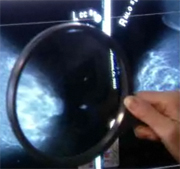
MONDAY, April 1 (HealthDay News) — The benefits of genetic testing to assess the risk of breast and ovarian cancers linked to the BRCA gene are limited to a small number of women, a new report indicates.
Mutations in the BRCA1 and BRCA2 genes greatly increase a woman’s risk of developing these cancers. Women with these mutations have a 70 percent chance of developing breast cancer — which is five times greater than in the general population — and increase their lifetime risk of ovarian cancer from less than 2 percent to as high as 46 percent.
An important step in preventing these cancers is helping women understand their risk, according to the U.S. Preventive Services Task Force.
In preparing a draft report and recommendations, the task force examined available evidence to determine if genetic counseling and testing could benefit women most likely to have BRCA mutations.
The task force concluded that more than 90 percent of American women — those whose family history does not indicate an increased risk for BRCA1 or BRCA2 mutations — will not benefit from genetic testing or counseling.
This is because current tests often provide inconclusive results and these women could be burdened with the uncertainty of whether they are at increased risk for cancer. Many of these women might choose to take powerful medications or have major surgery to reduce their risk of cancer, which would be unnecessary if they were not at increased risk.
Therefore, the task force said it continues to recommend against genetic counseling and BRCA testing in these women.
“At this point, scientific evidence only shows that BRCA1 and BRCA2 testing is beneficial for women who have reviewed their family history of breast or ovarian cancer with a primary-care professional and discussed the pros and cons of the screening test with a trained genetic counselor,” task force chairwoman Dr. Virginia Moyer said in task force news release.
“We hope that further research into ways to use genomic science, such as identifying women who have harmful BRCA genes but do not have a family history of cancer, could improve screening practices and even prevent some cancers,” she added.
The task force said it also found evidence to recommend that primary-care health providers screen women who have family members with breast or ovarian cancer to determine if their family history is associated with an increased possibility of having BRCA1 or BRCA2 mutations.
In situations where this is the case, women should receive in-depth genetic counseling to thoroughly review family history and — if indicated and after weighing the pros and cons of BRCA testing — undergo the test, the report said.
The recommendations apply to women who have not been diagnosed with breast or ovarian cancer but who have family members with breast or ovarian cancer and whose BRCA status is unknown.
The draft report and recommendations will be open for public comment until April 29.
“Every year, too many American women and families are faced with the challenge of dealing with breast and ovarian cancer diagnosis and treatment,” Moyer said. “We need better treatments, better screening methods and, most importantly, better ways to prevent cancer.”
More information
The U.S. National Cancer Institute has more about BRCA mutations and cancer risk.

